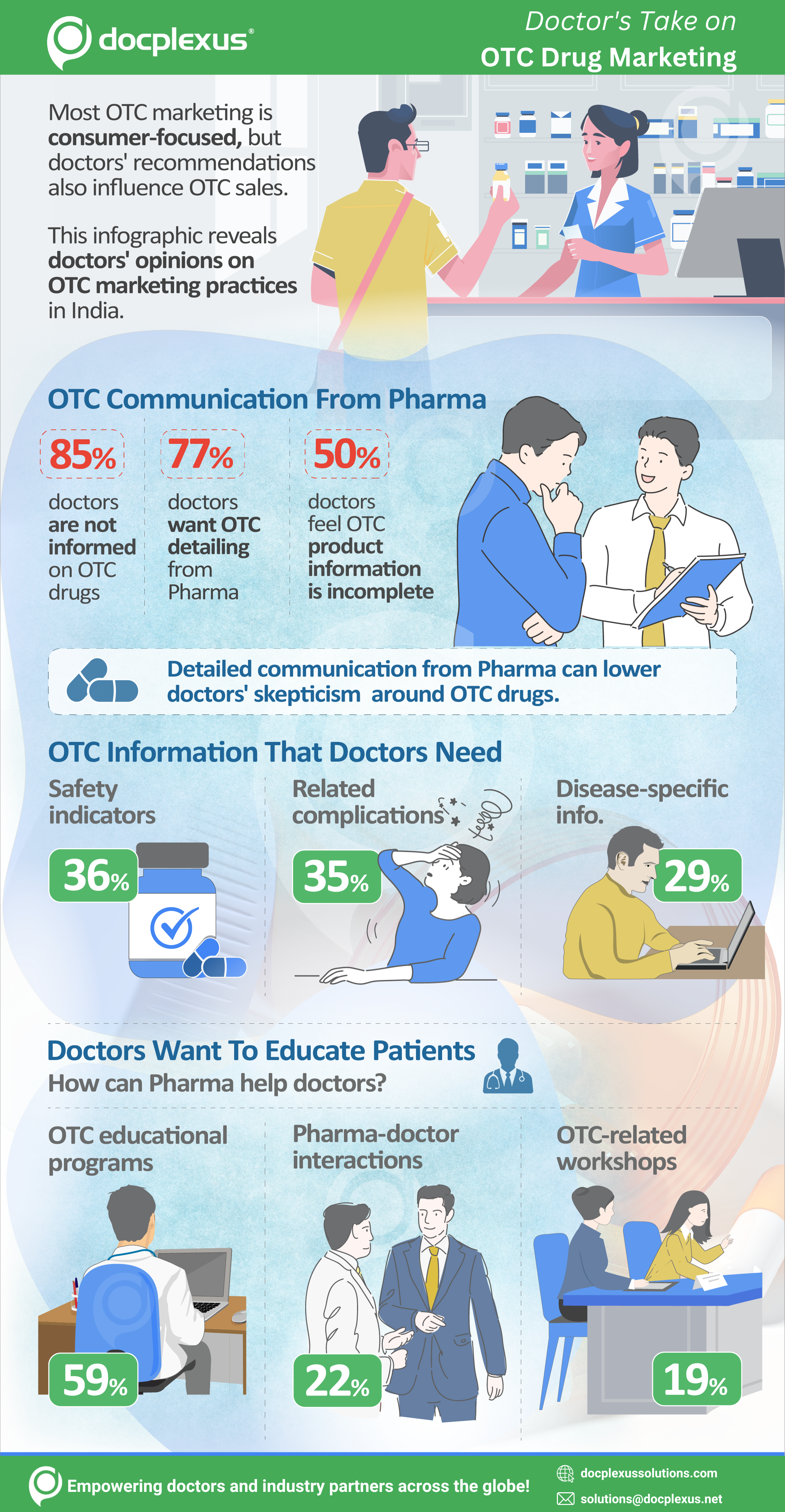
For a long time, Pharma companies looking to penetrate the OTC space focused their energies only on direct-to-consumer marketing, and HCP engagement wasn’t given much consideration. But doctors do influence OTC sales and ignoring them is a fallacy. Today, marketers are more aware of HCPs’ contribution to the success of their OTC brands. How can they best market non-prescription medicines to prescribers?
India’s Over–The–Counter (OTC) drug market was worth INR 14,000 crores, accounting for nearly 20% of the total pharma market in 2018. It is expected to grow rapidly (10–15% per annum) in the coming years. While MNCs have already established themselves firmly, domestic drugmakers have begun to grow aggressively. FMCG players are also trying their best to expand footprint.
Why Were Doctors Ignored By OTC MarketersHigh consumer focus – The market dynamics in the OTC segment differ from those in Rx. With big FMCG companies as competitors, OTC marketers have been focusing more on beefing up their distribution network and running mass-media advertising & promotional campaigns.
1.High cost of reaching doctors – A huge chunk (65-70%) of the marketing budget for OTC products is allotted towards consumers with only 10-15% left for field force activities. Dwindling facetime with doctors means that only high-margin Rx products get pitched.
2)Doctors prefer Rx drugs – Trust deficit is a hurdle for OTC drugs gaining doctors’ advocacy. In a poll we conducted (infographic below), 80% of doctors claimed that they never recommend OTC drugs to their patients. Indian OTC space is poorly regulated and there is no list of OTC medicines defined yet. Moreover, manufacturers are not bound to disclose the purpose of medicine, active and inactive ingredients, safety guidelines, etc. to their customers. These factors discourage doctors from actively recommending OTC products.
Why OTC Marketing to Doctors Makes Sense?
1)Doctors’ word matters – Indian patients put doctors on a pedestal, and products endorsed by them enjoy the highest trust. An IPSOS study found that OTC drugs recommended by doctors were purchased more by patients than non-recommended ones. Prescribers thus are gatekeepers of both Rx and non-Rx purchases. In some cases, patients prefer seeking doctor’s advice instead of self-medicating. This is true for infant & childcare and even lifestyle segment that covers weight management, dietary supplementation, etc. Nutrition therapy has always been underrepresented in the medical curriculum and doctors often need additional information for special population like diabetics, expecting mothers, infants, etc. Physician communication also gains prominence as more scientifically advanced products are developed.
2)Boosts brand loyalty – Marketing to doctors can pique awareness about specific brands and lead to patient trials. Patients are more likely to choose the brand suggested by their doctor and continue choosing it for future use too.
3)Improves competitiveness – OTC category is witnessing stiff competition with both pharma and FMCG players eyeing a chunk of the booming market. Doctors now have more than one brand to recommend for a particular condition which means marketers have to step up their medico-marketing efforts. Also, competition is stiff where both OTC and Rx drugs are viable treatment options. Most doctors perceive Rx medicines as more trustworthy than OTC ones. Marketers should, therefore, build a case for their non-Rx products through regular and detailed communication with HCPs. Doctors should have complete information on clinical trials (if any), recommended dosage, micronutrients present in the drug, its contraindications, and so on.
1)Product positioning – OTC drugs may be recommended by doctors as a preventive, remedial or supplementary therapy. It is necessary that treating physicians are made aware of where the product fits in the overall treatment plan.
2)Consumer insights – Doctors can offer pharma critical insights into patient behavior that can be used to formulate products that actually solve consumer pain points (instead of simply launching ‘me too’ versions and product extensions). It will also help marketers align their product communications to consumers’ needs. Key insights from doctors could include – most common symptoms cited by patients in clinics, top reasons for not sticking to the treatment regimen, the stage at which patients seek doctors’ assistance, and so on.
OTC marketers need to work on a strategy to engage doctors effectively. To help them do this, we ran an online poll on our platform. We asked our doctor community what they felt about OTC product communications from Pharma. 1,710 doctors shared their views. Here are the results –
What Doctors’ Want from OTC Marketers – Docplexus Survey Infographic

Most doctors hesitate to recommend OTC products. When asked what circumstances call for OTC prescriptions, they only cited emergency situations where no other medical aid is available. This sentiment could stem from general skepticism around – poor regulation of OTCs, patient’s ability to self-medicate, pharmacists’ capability to advise consumers on the right OTC medicines, and high risk of drug abuse among patients. (In our survey, 44% doctors said >70% of patients are likely to abuse drugs).
Majority doctors wanted product-specific communication from pharma but most pharma companies did not inform doctors on OTC medicines. Where communication happened, the information provided did not suffice the doctors’ needs.
OTC marketers need to up their medico marketing game by interacting with HCPs regularly, fulfilling their information needs and solving their pain points –
Best Ways to Market OTC Drugs to Doctors
1.Offer product samples – Doctors try their best to get patients to begin treatment and an initial push often leads to long term stickiness to a product. Product samples are a good way to encourage doctors to recommend particular OTC brand.
2.Revisit OTC detailing – The same OTC product should be marketed differently to consumers and doctors. OTC detailing for doctors cannot have a “consumer advertising” tone. Where possible, pharma reps must be able to back all efficacy & safety claims with clinical trial results and proof of evidence, so doctors can make an informed choice. There should be solid reasoning for why a brand is better than its competitors. Rather than talking about one product, marketers should position their companies as experts of the whole therapy area.
3.Tap a supporting need – Doctors may add OTC medicine to the prescription as a part of a broader treatment plan where the OTC drug treats associated problems. Marketers could communicate how their brand treats most common symptoms experienced by patients.
4.Be innovative – For most OTC products, there is little room to make scientific evidence the highlight of communication, so marketers must adopt an innovative approach. Think: Can your product be aligned to an environmental/social situation, say air pollution for cough syrup or malnourishment for nutrition therapy? Perhaps you could build a dialogue around food sensitivity/allergies in children. Creative campaigns can help OTC marketers associate their brand with the problems they help overcome.
5.Understand mindsets – Pharma must find out reasons why doctors choose to not recommend certain OTC drugs by conducting mindset analysis studies like the one above. Such studies will help reveal common misperceptions and information gaps related to these products. Marketers can then tweak the narrative to plug these gaps. Our survey suggests that doctors need more information on OTC product safety and associated complications. Marketers must ensure that the information provided by them fully suffices doctors’ needs.
6.Solve pain points – Doctors are more likely to recommend OTC products when they know that patients are aware of how to use the drug, in what dosage, under which conditions, etc. Most doctors need assistance to educate patients on safe ways of self-medication. Pharma can introduce programs and workshops specially designed to help doctors in this area.
7.Leverage digital media – Online media that enjoy doctors’ trust can instantly bridge the communication gap between pharma and physicians. Marketers should tap neutral online spaces where doctors can freely discuss any apprehensions about OTC products and gain a fresh perspective from fellow professionals. Pharma marketers can share OTC product-specific content on such spaces and open a channel of two-way communication with prescribers. Such online connect can prove valuable for bonding with doctors and gaining the latest insights into their mindset.
OTC marketers are making a wise move by tapping the medical community for their products. Right communication and supporting initiatives will determine whether they succeed in this endeavour or not.
